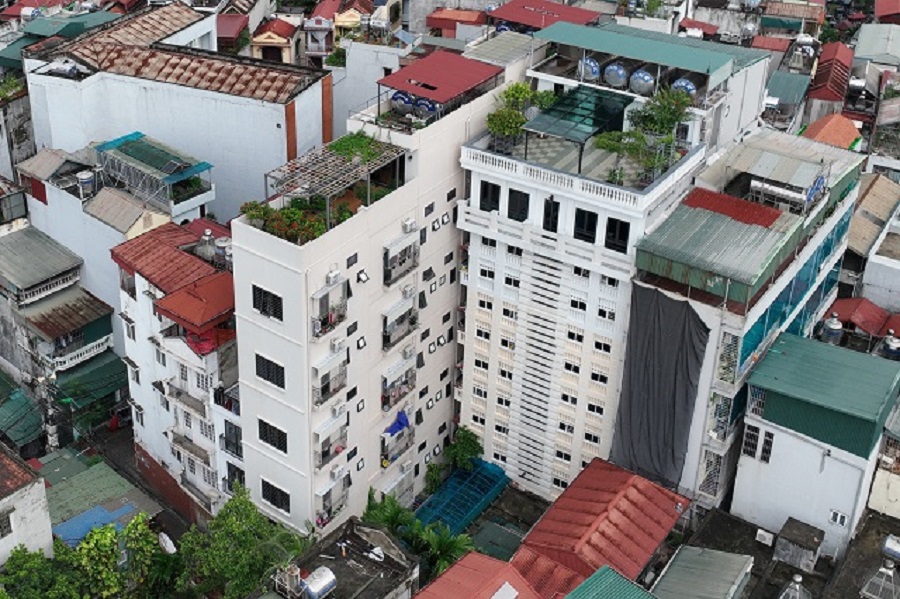Should mini-apartments be managed or prohibited?
According to experts, improvements in the management of building and operation of mini apartments by the government authorities and local governments are required in the long run.

Following the recent fire in a Hanoi mini apartment, many mini apartment owners and occupants have been more vigilant and proactive.
>> Mini-apartments require a legal framework
The National Assembly Standing Committee recently issued a special report on Vietnam's real estate sector, which included mini apartments.
Consequences of loose management
According to Mr. Nguyen Manh Khoi, Deputy Director of the Department of Housing and Real Estate Market Management (Ministry of Construction), in 2015, the Government submitted a report on mini apartments to the National Assembly and then proposed to the National Assembly that mini apartment regulations be incorporated into the 2015 Housing Law. As a result, the Government issued Decree 99/2015/N-CP to guide the 2015 Housing Law's implementation. Housing regulations are severely enforced. Individual residences, whether built with separate rooms or not, must fulfill these requirements.
The permit allows for 70% development in a freshly burnt mini apartment in Hanoi, but the homeowner erected 100%. This issue, according to Mr. Khoi, is tied to law enforcement. It is important to consider if the housing regulations are enough or whether further criteria are required.
Mr. Khoi noted that there are two regulations that regulate house construction. First, build apartments and single-family houses. The administration and operation of these apartments is the second component.
Buildings are erected on two floors with two or more apartments, according to appropriate requirements. However, because this kind has long been considered as a separate dwelling, the operation of these units is omitted.
Meanwhile, Mr. Le Hoang Chau, Chairman of the Ho Chi Minh City Real Estate Association, stated that government agencies are managing mini-apartments as separate houses for individuals and households, which has resulted in a situation in which mini buildings are allowed to have 100% mini apartments with an area not less than the minimum area. However, under current regulations, it should be understood that the type of mini apartment buildings must also adhere to the National Technical Regulations on apartment buildings, which stipulate that for commercial housing projects, the proportion of apartments with an area less than 45 m2 not exceed 25% of the total number of apartments in the project.
Furthermore, Mr. Chau determined that current laws do not require investment and business activities in mini apartment buildings of individuals and households to be carried out as commercial housing projects, so the Law on Real Estate Business contains no regulations on investment and business activities in mini apartment buildings of individuals and households.
The following fault is that there is no regulations to register a business or form a real estate firm in order to manage mini apartment buildings, which prevents enterprises from investing in mini-apartment buildings.
A legal framework needed
According to officials of government agencies and associations, forcing owners of small apartment buildings to undertake this or that is impossible. As a result, the state must provide a legal pathway for individuals to follow, while also improving public understanding of fire prevention and control for mini apartments.
According to expert Tran Huy Anh - Hanoi Architects Association, honeycomb-built apartments with an area of 8 - 10m2/apartment can be found in countries such as the Philippines and Singapore; or even in developed countries such as Japan,... there are many mini buildings with apartments as small as 6 square meters.
As a result, in the setting of congested land in major cities, housing options are determined by the demands of the users. "It is necessary to do good planning, quality management, and strict control from the local government, but cannot completely ban mini apartments" , Mr. Tran Huy Anh stated.
Mr. Le Hoang Chau, who shares the same viewpoint, believes that article 57 of the proposed Housing Law should be amended. The Ministry of Construction must restore the regulations of Circular 12/2012/TT-BXD for mini apartment buildings to be legal, while also complying with Ministry of Construction Circular 03/2021/TT-BXD, which clearly states that mini apartment buildings must be classified as commercial apartment buildings, and apartments with less than 45m2 must not account for more than 25% of total apartments.
According to Mr. Nguyen Manh Khoi, the Ministry of Construction has been tasked by the government with overseeing the drafting of the Law on Real Estate Business and the Law on Housing. The Ministry of Construction suggested that while developing apartments, project developers fulfill construction parameters such as fire protection; development must have both communal and private ownership; and construction licenses are necessary in all scenarios.
"The Provincial People's Committee will be tasked with regulating the traffic infrastructure system so that fire trucks can access the apartments; each apartment must have a certificate." When constructing a 20-unit building, the developer must draw up an investment project, similar to a commercial construction project," Mr. Nguye Manh Khoi stated.








